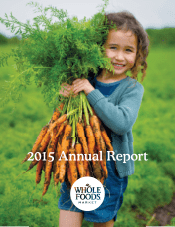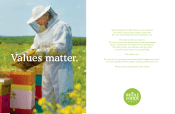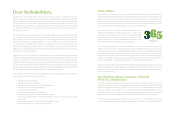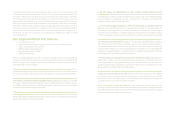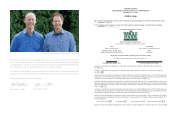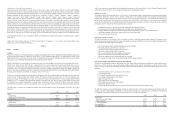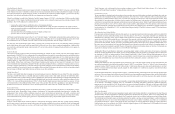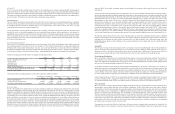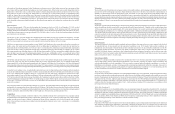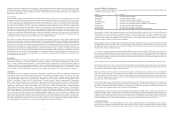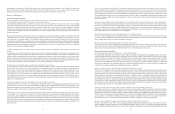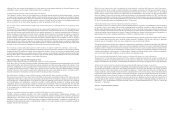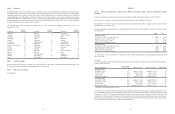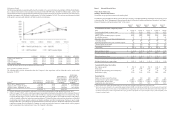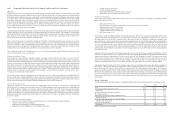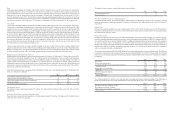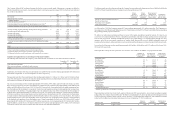Whole Foods 2015 Annual Report Download - page 8
Download and view the complete annual report
Please find page 8 of the 2015 Whole Foods annual report below. You can navigate through the pages in the report by either clicking on the pages listed below, or by using the keyword search tool below to find specific information within the annual report.3
Certified Organic Retailer
While retailers of organic products are not required by the U.S. Department of Agriculture (“USDA”) to become certified, Whole
Foods Market’s decision to voluntarily certify all of our stores and operations shows our deep commitment to organic consumers
and to the preservation of organic integrity. In 2003, we became the first national “Certified Organic” grocer and to this day
remain the only national supermarket with all store departments and operations certified.
Whole Foods Market is certified by California Certified Organic Farmers (“CCOF”), an independent, USDA-accredited, third-
party certifier. CCOF’s Organic Certification Program for retailers verifies we handle organic goods according to stringent USDA
guidelines. The CCOF audit process confirms that we:
• examine the current organic certification status of our organic products;
• maintain an extensive record-keeping process that demonstrates a fully traceable audit trail for our organic products;
• ensure our organic products are appropriately protected from commingling with conventional products and contamination
with prohibited materials;
• train team members in the handling practices of organic product; and
• open our stores to on-site inspections by CCOF.
All Whole Foods Market retail stores in the U.S. are “Certified Organic.” Additionally, certain facilities and product lines have
been certified organic through their own organic handling plans, including all of our regional distribution centers and several
of our bakehouses; our 365 Organic Everyday Value™ private label product line; and our Allegro Coffee™ line.
We offer more than 25,000 unique organic SKUs company-wide, covering all areas of our store including produce, packaged
goods, bulk, frozen, dairy, meat, bakery, prepared foods, coffee, tea, beer, wine, cheese, nutritional supplements, vitamins, body
care, pet foods, and household goods. Approximately 30% of our sales, outside of prepared foods and bakery, were organic in
fiscal year 2015.
Exclusive Brands
Our exclusive brands program, which generated approximately $2.1 billion in sales in fiscal year 2015 and currently features
approximately 5,300 SKUs, is a key component of our value platform and essential to our product innovation and differentiation
strategy. Led by our 365 Everyday Value® brand, exclusive brands accounted for approximately 14% of total retail sales in fiscal
year 2015, up from 13% of total retail sales in fiscal year 2014. Approximately 45% of our exclusive brand offerings are either
certified organic or “Non-GMO Project Verified.” Other exclusive brands include, but are not limited to, Allegro Coffee, Whole
Foods Market, Whole Paws, and Engine 2 Plant-Strong. Notable product launches in fiscal year 2015 included over 100 new
and re-branded dietary supplements; pollinator-friendly almonds and almond butters; a collection of organic barbecue sauces,
each with a unique regional flavor; a collection of body care products for babies; and an expanded item assortment for the holiday
season. In addition to our exclusive brands, we regularly offer more than 550 temporary exclusives, which are branded products
that are unique to Whole Foods Market in terms of flavor, size or other attributes.
Health Starts Here®
We believe our Health Starts Here program and our positioning as America’s Healthiest Grocery Store™ are key competitive
advantages. Health Starts Here is a mindful approach to healthy eating rooted in four simple principles to build better meals:
Focus on Whole Foods, Eat Plant-Strong™, Choose Healthy Fats, and Consider Nutrient Density. The nutritional guidelines for
this program were created by doctors and registered dietitians based on scientific research as well as guidelines proposed by the
USDA, U.S. Food and Drug Administration (“FDA”), World Health Organization and American Heart Association. To help
customers find the most health-promoting foods in our stores, products that meet these guidelines in our salad and hot bars,
prepared foods in our self- and full-serve cases, and all prepared foods venues carry our “Health Starts Here” logo.
Responsibly Grown
We introduced our Responsibly Grown “Good, Better, Best” rating system for produce and flowers in October 2014. Using a
science-based index, Responsibly Grown measures performance on important sustainable farming topics, including pest
management, farm worker welfare, pollinator protection, water conservation and protection, soil health, ecosystems and
biodiversity, waste, air, energy and climate. These ratings provide greater transparency for our shoppers, allowing them to make
more informed decisions, and recognize growers for responsible practices that go beyond their organic and local efforts.
Whole Trade® Guarantee
Products with the Whole Trade Guarantee label are sourced from developing countries and meet our high quality standards,
provide more money to producers, ensure better wages and working conditions for workers, and utilize sound environmental
practices. Whole Trade products are exclusive to Whole Foods Market. More than 500 products in our stores carry our Whole
4
Trade Guarantee seal, and demand for these products continues to grow. Whole Foods Market donates 1% of sales of these
products to Whole Planet Foundation® to help alleviate world poverty.
Commitment to Local
We are committed to buying from local producers whose products meet our high quality standards, particularly those who are
dedicated to environmentally friendly, sustainable agriculture. For some stores, “local” is defined as within a certain mile radius,
and for others, it means within the metro, state, or tri-state area. Buying local allows us to offer our shoppers the freshest, most
flavorful pick of seasonal products; it bolsters local economies by keeping money in the pockets of community growers; and it
contributes to responsible land development and the preservation of viable green spaces. Whole Foods Market currently purchases
produce grown locally on over 1,200 U.S. farms, and in fiscal year 2015, approximately 24% of the produce sold in our stores
came from local farms. Through our Local Producer Loan Program we have budgeted up to $25 million to support and promote
local production. As of September 27, 2015, we had disbursed approximately $18 million in loans to nearly 235 local producers
under this program.
Meat Standards and Animal Welfare
From principles of animal husbandry to food safety practices, we support innovative production systems and have standards for
how animals are raised and handled during every step of the process. For 34 years, our quality standards have prohibited the
administration of hormones of any type to animals raised for meat in our stores, including beef cattle and lamb (the only two
species for which the USDA permits the use of hormones). Beta agonists, which are used to enhance growth and develop lean
muscle tissue in livestock, are also prohibited. In addition, Whole Foods Market prohibits the use of antibiotics for disease
prevention in farm animals. Instead, we believe good management practices are the best way to maintain animal health. Over
the years, many of our producers have innovated and learned to use alternative remedies found effective in treating animals. In
2002, we extended our standards to prohibit the use of therapeutic antibiotics for treating disease or infection. Sick animals are
required to be treated, but they cannot then be sold to Whole Foods Market.
Additionally, Whole Foods Market is dedicated to promoting animal welfare on farms and ranches for all species of animals
raised for our meat departments. Since 2000, we have worked diligently with our suppliers to continually improve and evolve
our standards. In 2008, we implemented the Global Animal Partnership’s 5-Step® Animal Welfare Rating program in all our
stores in the U.S. and Canada. All beef, chicken, pork and turkey in our fresh meat cases comes from producers whose third-
party audits substantiate they meet at least the basic standards of this certification, rated on a scale from 1 to 5+.
Seafood Sustainability
Whole Foods Market sets strict requirements for the seafood we source. All wild-caught seafood we sell is from fisheries that
are certified sustainable by the Marine Stewardship Council (“MSC”) or rated either “Green” or “Yellow” by the Monterey Bay
Aquarium Seafood Watch® program and The Safina Center. Unlike many other grocery stores and seafood markets, we don’t
sell any red-rated seafood. Red ratings typically suggest the fish population is overfished or caught in ways that harm other
marine life or habitats.
Our farmed seafood standards – the highest in the industry – prohibit antibiotics, parasiticides in the water or feed, and algaecides
on the nets. We source farmed seafood from the world’s leaders in environmentally responsible aquaculture, and the “Responsibly
Farmed” logo in our seafood cases indicates these farms pass third-party audits to verify they meet our strict quality standards.
GMO Transparency
We believe that quality and transparency are inseparable, and providing detailed information about the products we sell is part
of our mission. Accordingly, in March 2013, we committed to providing full GMO (“genetically modified organism”)
transparency for our customers by 2018. We are well on our way to meeting this deadline. Currently, we offer more than 25,000
certified organic items (which must be non-GMO to meet USDA organic standards) and over 11,000 “Non-GMO Project Verified”
products in our stores.
Body Care Standards
We believe the quality of the items and ingredients people apply to their bodies topically is as important as the food they put
into their bodies. We ban 50 ingredients commonly found in conventional body care products, and we never sell products that
have been tested on animals. Our Premium Body Care™ standards raise the bar even higher, banning more than 400 ingredients.
This additional tier of standards meets our strictest guidelines for quality sourcing, environmental impact, results and safety and
was designed to evolve as new science-based studies and research come to light. In addition, since there are no mandatory
government standards for “organic” label claims on body care products, we require all products making an organic claim to be
certified under one of two standards: the USDA’s National Organic Program or NSF International’s 305 Standard for Personal
Care Products Containing Organic Ingredients.

